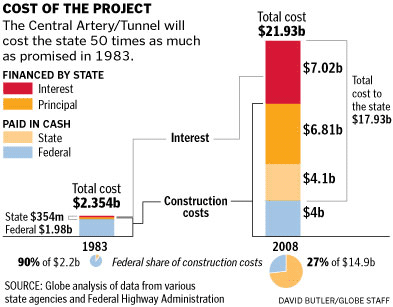
Today's top story in the Boston Globe should be familiar to readers of this blog: the debacle known as Boston's Central Artery project, otherwise known as the "Big Dig." Some highlights from "Big Dig's red ink engulfs state":
Massachusetts residents got a shock when state officials, at the peak of construction on the Big Dig project, disclosed that the price tag had ballooned to nearly $15 billion. But that, it turns out, was just the beginning.Breathe that in: almost half of all state highway funds have been squandered on 0.07% of the Bay State's roadway system. This is why my daily commute is a slalom course of orange barrels, jersey barriers and potholes. And while project management has become a modern-day vocation for some, there's no getting around Milton Friedman's axiom that spending other people's money is the high road to waste and abuse. Although new gas taxes are being ruled out (duh), tolls are being hiked and Massachusetts lawmakers are looking at the income tax to close this yawning gap. But, for now, a big pile of money is being loaned to the state which only means that the next generation of Bay Staters will have to cover the cost of that hole in the ground.
Now, three years after the official dedication of the Central Artery/Third Harbor Tunnel, the state is reeling under a legacy of debt left by the massive project. In all, the project will cost an additional $7 billion in interest, bringing the total to a staggering $22 billion, according to a Globe review of hundreds of pages of state documents. It will not be paid off until 2038.
The state is paying almost 80 percent of its highway workers with borrowed money; the crushing costs of debt have pushed the Massachusetts Turnpike Authority, which manages the Big Dig, to the brink of insolvency; and Massachusetts spends a higher percentage of its highway budget on debt than any other state.
The debt is a big part of why Massachusetts had the highest tax-supported debt per capita in the United States last year.
During the last three years, Massachusetts spent the most of any state, by far, 38 percent of its highway budget, on debt payments, according to Globe analysis of federal data. The median is less than 6 percent nationally.
The state has also been forced to meet payroll demands for 1,400 Massachusetts Highway Department workers with borrowed money because it does not have enough cash to pay them. That means that painters and clerical workers paid around $18 an hour cost the state $28.80 an hour. The 80 percent of the workforce being paid with borrowed money compares to 14 percent before the Big Dig work began.
The authority's annual payments on its Big Dig debt are $115 million now. Those payments will level off at $145 million annually by 2020 and continue for another 18 years. The capital budget for construction, paving, and inspection for the Big Dig and the 137-mile Massachusetts Turnpike, meanwhile, has been slashed to $22 million, about 19 percent of the debt expense.
There are two sources of state highway funds: state borrowing and reimbursement to the state on federal gasoline taxes collected in Massachusetts. The Big Dig, which makes up 7.5 miles of an 11,000-mile system, gobbled up about 40 percent of those funds during the last 17 years, data show.
5 comments:
With all that being said, the fine people of the Bay State will keep voting for the same people who got them in that mess because, after all, they can't have those damn right-wingers in office.
The good news is that, as of now, it appears that the rest of us (non-Bay State taxpayers) are not paying any more than the original cost.
Of course, the Congress is young and Ted may eventually get around to forcing, I mean asking, the rest of the nation to pick up the tab for this nightmare.
With MA, and the Boston MSA, loosing population, does this not create additional problems with repayment?
I look forward to seeing more Bay State refugees like myself around the rest of the country. Just leave your destructive voting habits behind when you move.
Bad news like this could increase the floodtide of the Massachusetts population exodus. Maybe all the way up to 0.2%.
Post a Comment